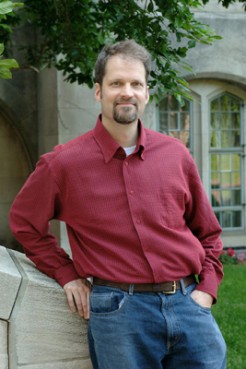
Stephen Prothero, a professor of religion at Boston University, collects civil scriptures in his new book ?The American Bible: How Our Words Unite, Divide, and Define a Nation.?
(RNS) Religion scholar Stephen Prothero has traced the path of Jesus from son of God to American icon, chastised the religiously illiterate, and tweeted the essence of the world’s great faiths in 140 characters or less.
Now, the Boston University professor has a new book “God Is Not One,” and a new task: outlining the differences between religions, and why they matter.
Prothero spoke recently about American ignorance, Oprah’s Kool-Aid, and why the Dalai Lama is a dangerous man. This interview has been edited for length and clarity.
Q: Aren’t the differences between religions apparent to almost everyone, painfully so sometimes?
A: If they were I wouldn’t have written the book. Inside academia, more and more scholars are understanding and emphasizing the differences. But there is a widespread view elsewhere that all the religions are basically the same, just different paths up the same mountain.
Q: Where are people getting that idea?
A: That’s the message from books like “Eat, Pray, Love,” from Oprah, from Huston Smith’s “The World’s Religions” — the best-selling book in the history of religious studies.
Q: Polls show that nearly 70 percent of Americans believe that more than one religion can lead to eternal life. Are they drinking Oprah’s Kool-Aid, or what?
A: I think we want all the religions to be basically the same because we don’t want religious violence. We have this naive hope — I call it `pretend pluralism’ — that is rooted in some very positive ideals and aspirations: that we won’t kill each other for religious reasons, that religion unites us rather than divides us.
Some of the other people behind this idea, for example, are Gandhi and the Dalai Lama. But the only way we can have lasting religious cooperation is to see religions how they are, rather than how we hope them to be. For me that means seeing the good, and the evil, they do.
Q: But isn’t it better to have a bunch of Dalai Lamas who seek religious similarities, rather than Osama bin Ladens, who see only differences, and want to kill people over them?
A: I’ll take the Dalai Lama over Osama Bin Laden any day. But there are instances, for example, the U.S. going into Iraq, that were driven by false views of religions. We didn’t understand the differences between Sunnis and Shias because we didn’t have a high-school level education about Islam. People are dying in Iraq today because of a false idea about religion.
Q: But isn’t our government’s ignorance a secondary problem? The primary problem is Sunnis and Shias killing each other over religious differences. Wouldn’t everyone be better off if we emphasized similarities instead?
A: That’s a totally unrealistic hope. Convincing Sunnis and Shias that they don’t have any differences is like saying we’ll elect my 12-year-old daughter as president. It’s not going to happen. The alternative is for us to understand religious differences and then come to respect and tolerate one another on the basis of those differences.
Q: But can’t religious attitudes change? For example, 50 years ago, would most Americans have said there is more than one path to eternal life?
A: Let’s take the idea of race, and of a colorblind society. We correctly learned (a generation ago) that that’s a dead end. Saying “I’m black,” is not the same as killing other people over it. Why is it so bad to say that “I’m proud of being black, or being a Lutheran?”
Q: Doesn’t pride often bleed into violence, though, because it fosters the idea that your differences make you better than others?
A: You are jumping from the articulation of difference to intention to commit violence. I think you can say “I’m black and proud,” without their being anything wrong with that. I don’t think we need to pretend we’re all the same.
Q: Okay, let’s jump tracks. Brit Hume: religious genius, or dunce?
A: I criticized Hume (when he said Tiger Woods should convert from Buddhism to Christianity in January), because he was illiterate about Buddhism. Buddhism is not about salvation or forgiveness. I thought it was great when Tiger spoke back and said, “The problem is not that I’m not a Christian. The problem is, I was a bad Buddhist.”




